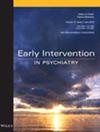Differences Between Users and Professionals in Preferences for Youth Mental Health Service Attributes: A Discrete Choice Experiment
Abstract
Introduction
Previous work showed that young people prefer youth-oriented mental health services that offer individual help in houses in urban areas, with short wait times and low costs. The present paper aims to examine which service options professionals working in social welfare or mental health services prefer for addressing young people's mental health needs, comparing their views with those of young people.
Methods
Professionals (N = 176) and youth aged 16–24 years (N = 258) participated in a discrete choice experiment (DCE). Panel mixed logit (PML) models were used in both stakeholder groups to ascertain relative differences in attribute weights. We also estimated an overall PML model incorporating the effect of stakeholder group on the attributes.
Results
Professionals found the attributes ‘cost’ and ‘wait times’ most relevant to young people's mental health service needs, indicating a preference for services characterised by affordability and minimal wait periods. In contrast, young people adhered more importance to the attribute ‘format’ (individual rather than group therapy). Furthermore, professionals considered a café or youth centre the most suitable location for a service, rather than a house in the city, and they disfavoured care provision by professionals in adult mental health services more than young people did. Finally, the attributes ‘peer support’, ‘opening hours’ and ‘anonymity’ were deemed relevant by professionals but not by young people.
Conclusion
The perspectives of both professionals and young people offer a unique point of view on care provision, stressing the importance of integrating them in preference-based research and service design.

 求助内容:
求助内容: 应助结果提醒方式:
应助结果提醒方式:


